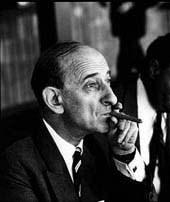Raymond Aron facts for kids
Quick facts for kids
Raymond Aron
|
|
|---|---|

Raymond Aron (1966) by Erling Mandelmann
|
|
| Born | 14 March 1905 6th arrondissement of Paris, France
|
| Died | 17 October 1983 (aged 78) 4th arrondissement of Paris, France
|
| Education | École Normale Supérieure, University of Paris (Dr ès l) |
| Era | 20th-century philosophy |
| Region | Western philosophy |
| School | Continental philosophy French liberalism |
|
Main interests
|
Political philosophy |
|
Influences
|
|
Raymond Aron (born March 14, 1905 – died October 17, 1983) was a very important French thinker. He was a philosopher, a sociologist (someone who studies society), a political scientist (someone who studies government and politics), a historian, and a journalist. Many people consider him one of the most important French thinkers of the 20th century.
Raymond Aron was also known for his long friendship with another famous philosopher, Jean-Paul Sartre. Their friendship sometimes had its ups and downs. Aron was seen as a balanced voice in politics. He had followers from both left-wing and right-wing political groups. He often described himself as a "left-wing Aronian" rather than a "right-wing" one. He is usually called a conservative liberal, which means he believed in freedom but also in traditional values. Aron wrote many books and articles on a wide range of topics.
Life and Career
Raymond Aron was born in Paris, France. His father was a lawyer from a Jewish family. Raymond studied at a famous school called the École Normale Supérieure. There, he met Jean-Paul Sartre, who became his friend and later his intellectual rival. Aron believed in rational humanism, which focuses on human reason and ethics. He was a leader among those who did not agree with existentialism, a different philosophy.
In 1928, Aron came in first place on a difficult philosophy exam called the agrégation. Interestingly, Sartre failed the same exam that year. In 1930, Aron earned his doctorate degree in the philosophy of history.
He had just started teaching at the University of Toulouse when World War II began. He joined the French Air Force. When France was defeated by Germany, he went to London. There, he joined the Free French forces, which fought against the Germans. He also helped edit a newspaper called France Libre (Free France).
After the war ended, Aron returned to Paris. He taught sociology at important schools like the École Nationale d'Administration and Sciences Po. From 1955 to 1968, he taught at the Sorbonne. Later, he also taught at the Collège de France and the École des hautes études en sciences sociales. In 1953, he became friends with an American philosopher named Allan Bloom.
Aron was a journalist his whole life. In 1947, he became a very important writer for Le Figaro newspaper. He wrote columns there for thirty years. After that, he joined L'Express and continued writing political columns until he passed away.
He was recognized for his work by many groups. In 1960, he became an honorary member of the American Academy of Arts and Sciences. In 1966, he joined the American Philosophical Society. In 1978, he started a new journal called Commentaire. It was a quarterly magazine for ideas and discussions. Raymond Aron died from a heart attack in Paris on October 17, 1983.
Political Beliefs
While living in Berlin, Aron saw the Nazi Party rise to power. This experience made him strongly dislike all forms of totalitarianism. Totalitarianism is a system where the government has complete control over people's lives. By the 1950s, he also became critical of some economic ideas. He thought that focusing too much on private property was like an "inverted Marxism."
Aron always supported a "moderately moderate" type of liberalism. This means he believed in freedom but also in a balanced approach. He thought that a "mixed economy" was the best way for countries to manage their money and resources. A mixed economy combines elements of both free markets and government control.
Ideas on Politics and War
Raymond Aron wrote important books about thinkers like Karl Marx and Carl von Clausewitz. In his book Peace and War, he explained his ideas about how countries interact with each other. He argued that a country's government has a monopoly on the legitimate use of physical force within its own borders. However, he said this rule does not apply to how different countries deal with each other.
In the 1950s, Aron thought about how nuclear weapons would change the world. He believed that even with nuclear weapons, countries would still need regular armies. He called this idea a "nuclear taboo." This meant that countries would be very unlikely to use nuclear weapons. So, traditional military forces would still be important for solving conflicts.
Selected Writings
Raymond Aron was a very productive writer. He wrote thousands of newspaper articles and hundreds of academic papers. He also wrote about forty books. Some of his well-known works include:
- German Sociology (1957)
- Introduction to the Philosophy of History (1948)
- The Century of Total War (1954)
- Peace and War (1966)
- Democracy and Totalitarianism (1968)
- Main Currents in Sociological Thought (1965)
- Clausewitz: Philosopher of War (1983)
See also
 In Spanish: Raymond Aron para niños
In Spanish: Raymond Aron para niños
 | Aurelia Browder |
 | Nannie Helen Burroughs |
 | Michelle Alexander |

